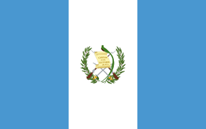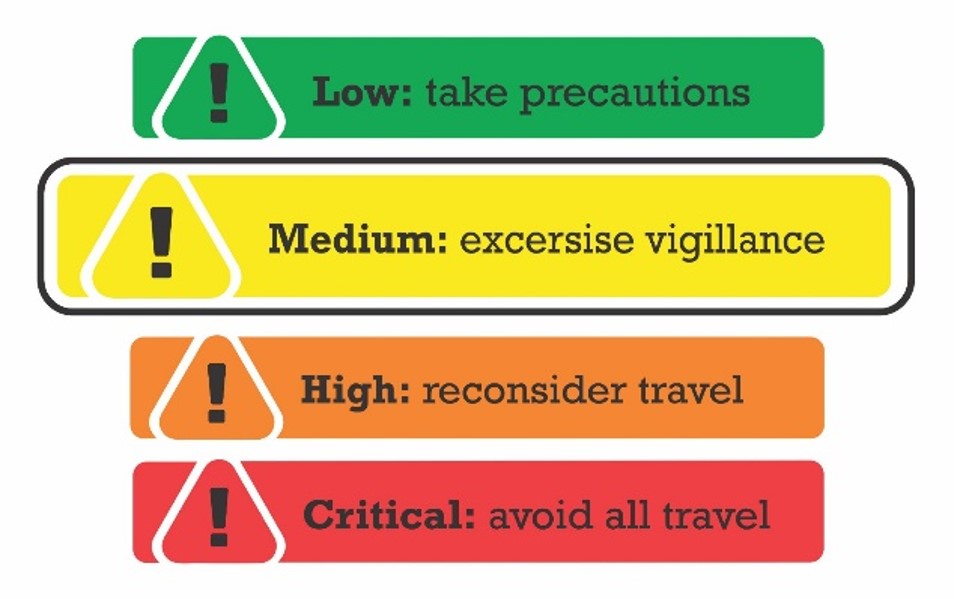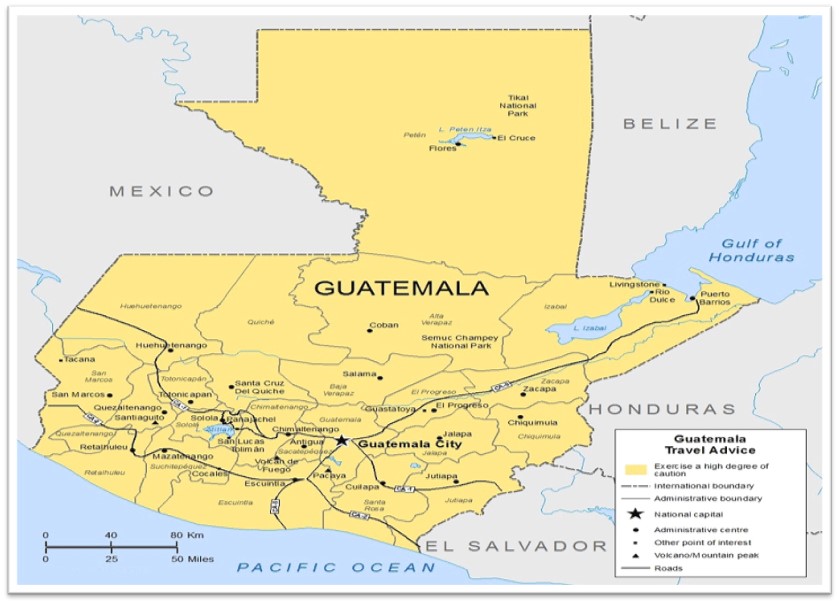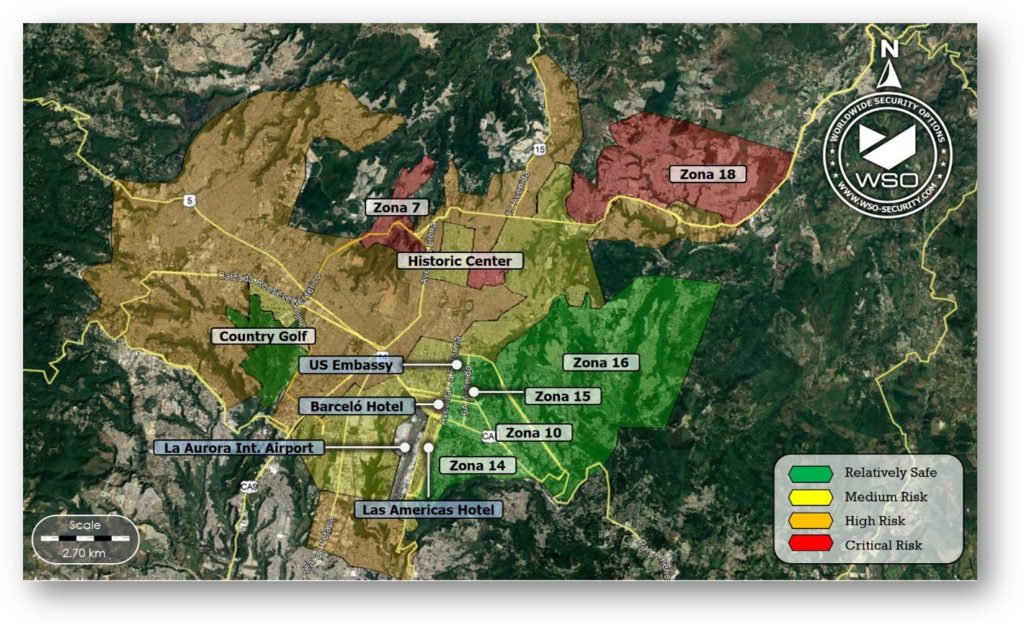| Official Name: | Republic of Guatemala |
| Official Language: | Spanish |
| Area: | 108,889 km2 (42,042 sq mi) |
| Population: | 17,263,300 |
| Time Zone: | UTC−6 |
| Capital City: | Guatemala City |
| Elevation (Guatemala City): | 1,172 m (3,845 ft) |
| Currency: | Quetzal (CRC) |
| Main Cities: | Guatemala City, Quetzaltenango, Escuintla |
| Main Port: | Port of Quetzal |
| Required visa for entry: | Nationals from Canada, EU countries, and the UK and others DO NOT require visas. Click here for more information concerning visa requirements. |
| Required vaccination for entry: | None |

Main Risks:
Theft, robbery, kidnapping, extortion, rape, drug and human trafficking, fraud, vehicle assault.
Executive Summary
Guatemala features medium risks. Security risks increase considerably in remote and border areas beyond the main urban areas, as well as in impoverished neighborhoods of Guatemala City. Due to the considerable threat posed by crime, we advise procuring secure transportation services for all types of travel. For high-profile trips, we further recommend hiring executive protection services.

General Risk Level: MEDIUM.
The risk generally remains stable throughout the country. That said, travelers should avoid non-essential travel through high-risk areas, including remote and jungle areas, and impoverished neighborhoods in urban areas with little police control. We recommend studying a security plan under the supervision of reputable security professionals before traveling to Guatemala, especially if the itinerary requires travel to sites outside the capital city.

Crime and Security
The main threat to those visiting Guatemala stems from opportunistic low and medium level crime. Although violent incidents are more likely to take place in impoverished neighborhoods and remote areas, crime is also recurrent in relatively safe areas. Many criminals in the city of Guatemala often operate on motorbikes and assault vehicles at a standstill and distracted passersby. Theft is also a threat to those visiting tourist-frequented places like Antigua Guatemala and the archeological site at Tikal.
As it is the case with other countries in the region, criminal organizations remain a security threat nationwide. Armed shootouts between opposing groups (locally known as “maras”) are common, especially amid clashes for territory control and influence.
The main crime organization in the country are the Mara Salvatrucha (MS13) and Barrio 18 (Street 18). Given that these groups operate in the capital, low-level criminals sometimes procure heavy weapons from gangs. In urban areas gangs are responsible for low-level drug-trafficking and extortion crimes against businessmen. That said, organized groups do not generally target tourists or foreigners. Their presence is stronger in remote and rural areas, especially in the bordering area with Mexico. In any event, we advise against non-essential travel to remote and sparsely populated localities, keeping travel through the countryside to a minimum.
Bear in mind that in Guatemala the storm and rain season lasts between March and November. Inclement weather represents a security threat, especially in remote and seasides areas, and could potentially lead to travel disruptions and deficiencies in basic services.
Guatemala has three active volcanoes: Pacaya, Santiaguito, and Fuego. The latter is located approximately 30 kilometers south of Guatemala City. Although volcanic activity is not generally deemed a threat, visitors should review the latest news before traveling.
The Ministry of Tourism has a designated police force (PROATUR), responsible for supporting and protecting tourist groups during excursions.
Security in Guatemala City
Criminal and violent acts are liable to be witnessed throughout the city, even in relatively safe areas. Therefore, considering high crime rates in the city, we advise against traveling through the capital without secure transportation services. If these are unavailable, resort to reputable taxi services previously hired through the prominent hotels. In any case, it is best to lodge and carry out business and transactions in Zones (“Zonas”) 10, 14, 15, and 16. These districts house the middle and upper classes as well as business interests. Moreover, they are perceptibly safer due to higher police presence and private security elements. The main hotels and embassies can also be found in these areas.
Furthermore, these districts, are located near La Aurora International Airport (GUA), the largest entry point in the country. Therefore, staying in these districts minimizes the necessity of traveling throughout the city, reducing exposure to crime in high and critical-risk areas. At any rate, for security reasons refrain from non-essential travel during the dark hours.
From a security standpoint, it is feasible to visit the Historic Center due to heightened police presence. However, the risk of crime is still higher than in the aforementioned areas. As a rule of thumb, exercise vigilance and stay alert at all times.

Transportation
For security reasons, in Guatemala, public transportation should be avoided. We recommend procuring reputable secure transportation services before traveling to the country, for the whole duration of the trip. This advice is especially relevant in case of business, high-profile trips, and itineraries involving travel to locations in the countryside. For high-profile trips, we further advise hiring executive protection services. Use taxis as last resort provided they are recommended by the prominent hotels and preferably booked in advance. Bear in mind that there are numerous informal taxis in the country and that drivers might attempt to take advantage of foreign passengers to inflate the price of the trip.
Land routes are not necessarily in good condition. Therefore, coupled with the threat posed by organized crime, travel through the countryside and remote jungle areas poses additional security risks, especially during the night or under conditions of poor visibility. If traveling by land, do not deviate from primary thoroughfares. It is best to avoid secondary routes removed from central localities and which remain in poorer circumstances.
If travel involves visiting locations outside Guatemala City, whether for tourist or business trips, make sure to plan the route in advance under the supervision of local security professionals. Educated assessments should enable the security contractor to determine the safest route and avoid unilluminated or otherwise dangerous paths.
Travelers intending to visit Tikal can use commercial flights from Juan Santamaría International Airport (SJO) to Mundo Maya Airport (FRS) in the city of Flores. From there, the trip to the archeological site should last approximately 60 minutes. That said, we do not recommend making the trip without procuring secure transportation services first.
Health and Sanitary Conditions
Guatemala is vulnerable to tropical storms. Travelers should pay attention to meteorological conditions and avoid touristic trips during the hurricane and rainy season, particularly between May and November.
Travelers should generally vaccinate against yellow fever, tetanus, hepatitis A and B, and typhoid. Taking into account the tropical weather, it is very important to wear protection against bugs and avoid leaving body areas uncovered to mitigate the risk of suffering insect and mosquito-borne diseases such as Dengue, Chagas, and the Zika virus. These precautions should be followed at all times while entering remote and jungle areas. The quality of tap water in Guatemala City and the main urban areas is relatively high but this is not necessarily the case in remote and rural areas that lack adequate sanitary infrastructure.
It is therefore recommended to drink sealed bottled water while visiting or staying in such areas. It is not advised to travel without international health insurance covering emergency medical evacuation to the country of origin.
Take essential health precautions to mitigate the risk of contracting diseases or viruses. Carry masks in crowded places such as airports and maintain rules of social distance and avoid contact with surfaces of common use in public places. Always carry hand sanitizer.
Tactical Recommendations
Exercise vigilance and situational awareness throughout the trip to Guatemala, especially in urban areas vulnerable to low and medium-level criminal activity. In Guatemala City avoid venturing into high and critical-risk areas.
We recommend procuring private transportation services for all travel to Guatemala, especially for business or other itineraries that could require travel through the countryside. For high-profile trips, we further recommend hiring executive services. For security reasons, do not use public transportation. If required, use only taxis vetted by the main hotels, preferably booked in advance.
Given the risk posed by organized crime, avoid non-essential travel to remote or sparsely populated locations, especially in bordering areas.
If travel by route through the countryside is required, avoid all detours, especially while traveling through sparsely populated rural or jungle zones. If possible, plan routes and stopovers ahead with the support of a local security contractor.
Avoid carrying large sums of cash or valuables during the trip. We advise against wearing or carrying items in public that may give the impression of economic affluence and which could attract unwanted attention from criminals.
Avoid traveling through the country in sport or luxurious cars which could attract unwanted attention from criminals and corrupt police officers.
Do not resist armed robbery attempts. We recommend to always carry a few 200 CRC bills for duress cases, specifically to appease criminals looking for easy money.
For security reasons avoid travel during night hours, including Guatemala City.
We recommend lodging in reputable establishments and hotels with private security. In Guatemala City, it is best to stay in Zones 10, 14, 15, and 16.
Avoid the vicinity of every kind of political demonstration or rally in urban areas. Peaceful protests can be infiltrated by violent elements.
Take all necessary precautions to mitigate the risk posed by insect mosquito-borne diseases. When visiting remote locations drink sealed bottles if the quality of tap water is questionable.
Emergency Contacts
Police: 110
Ambulance: 128
Fire: 123
WSO Global Command Center: +1 956 467 4858 / gcc@wso-security.com
Security advice and assistance over WhatsApp: +593 99 461 1128 / +521 81 1511 3166



